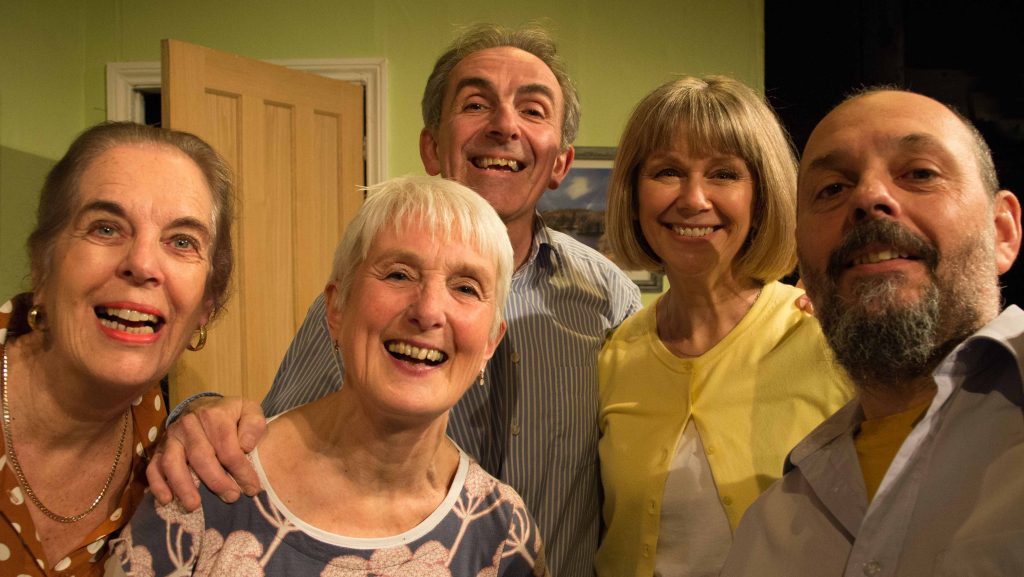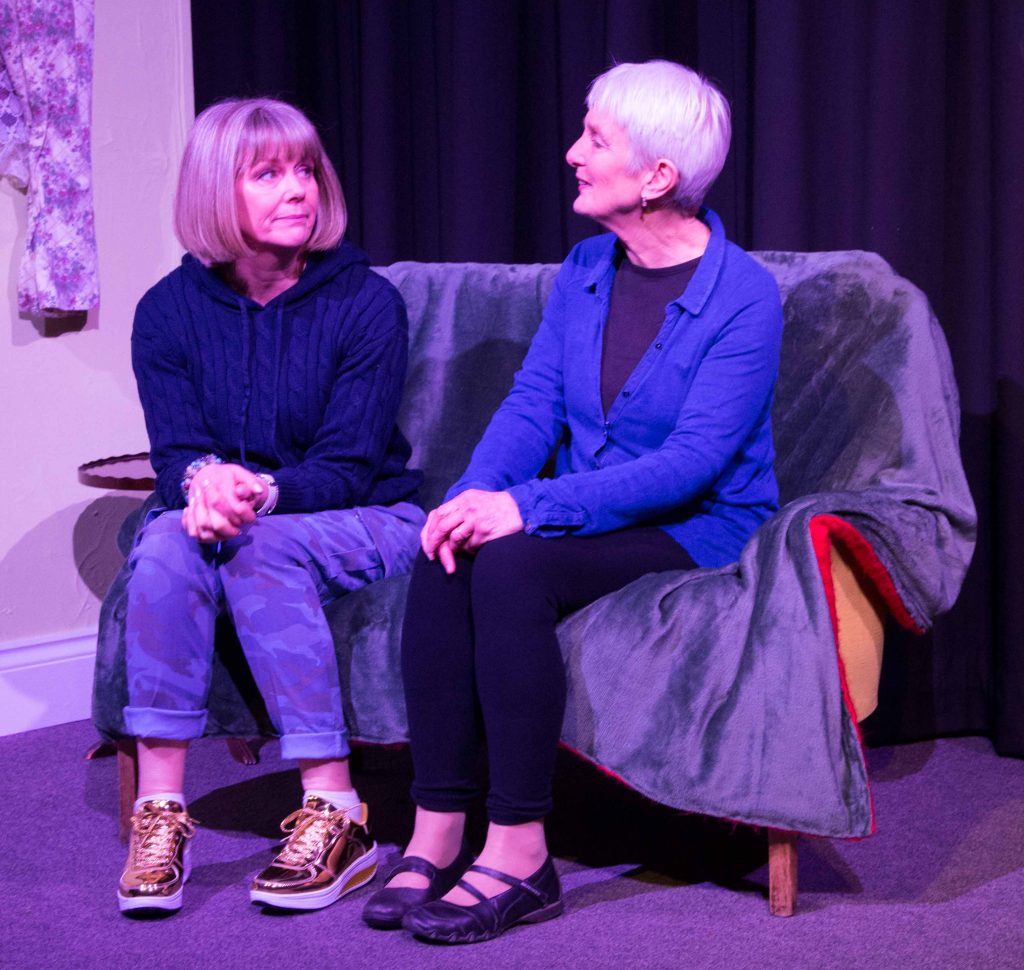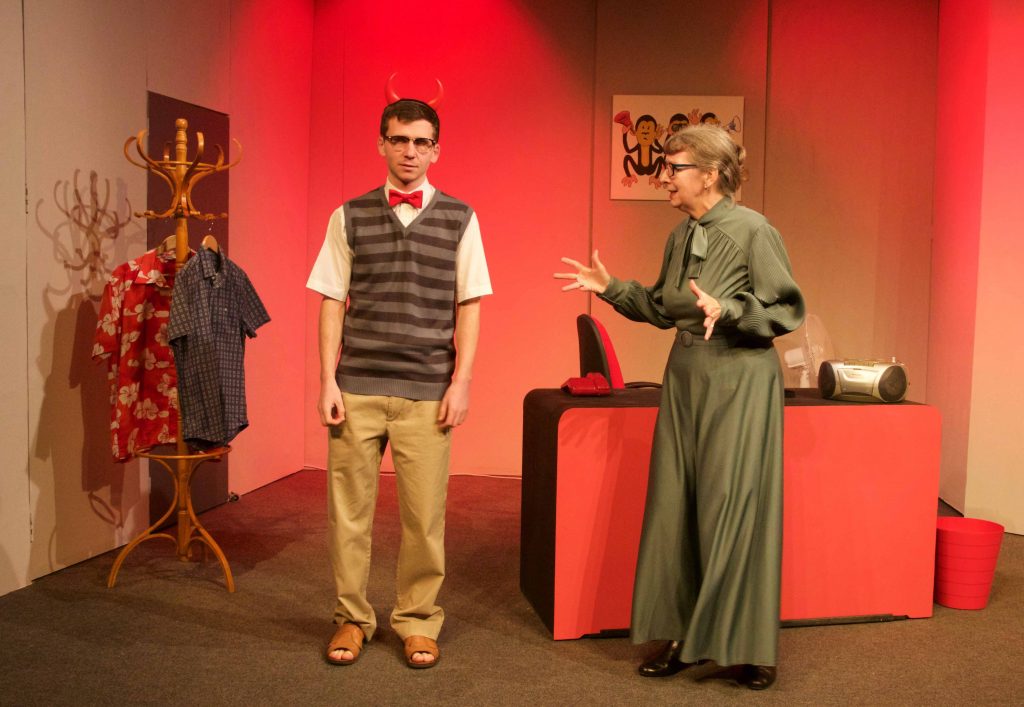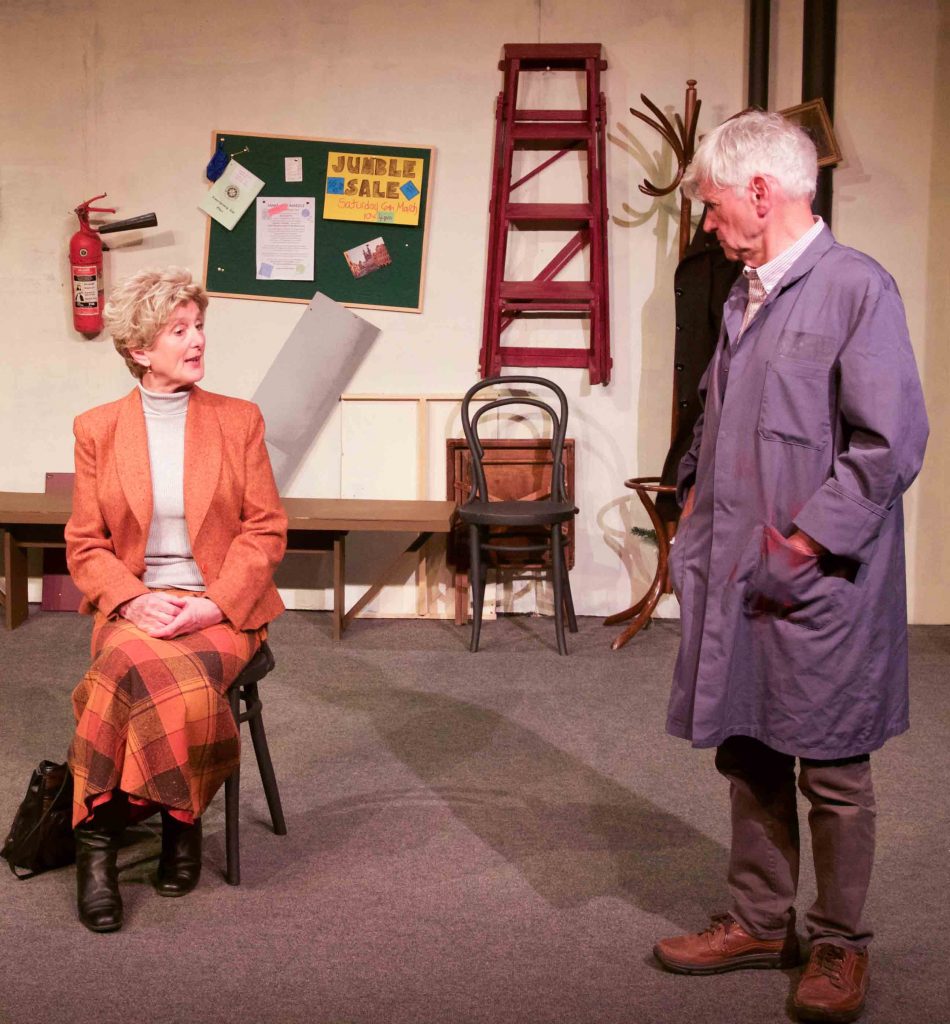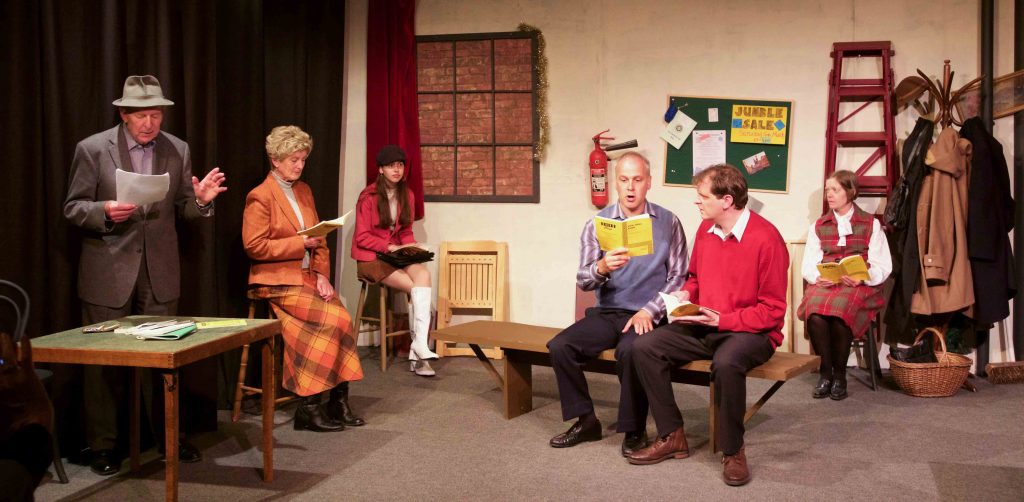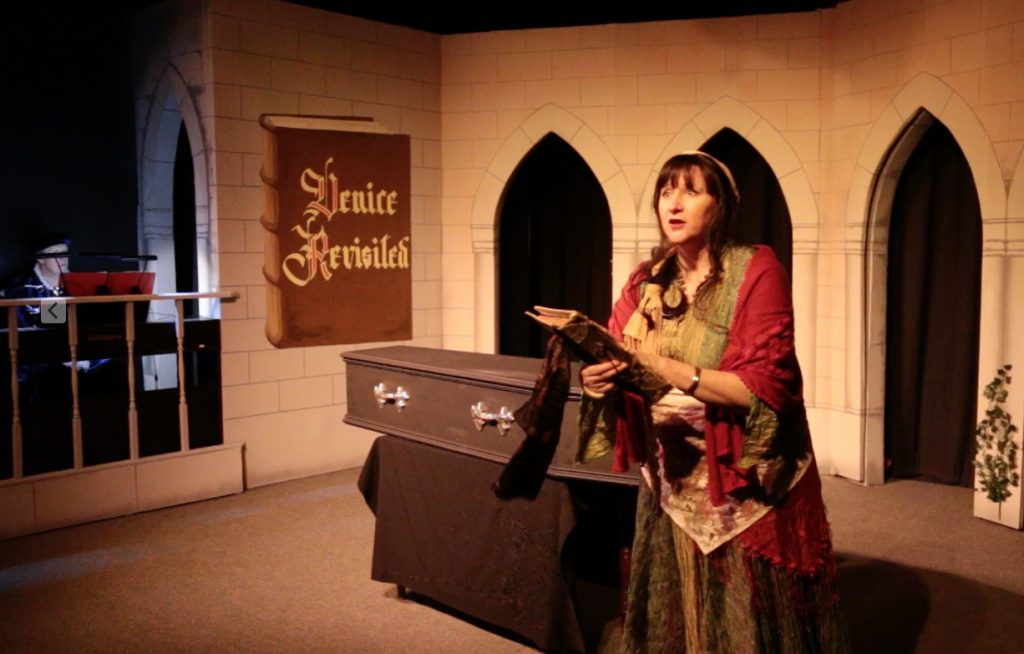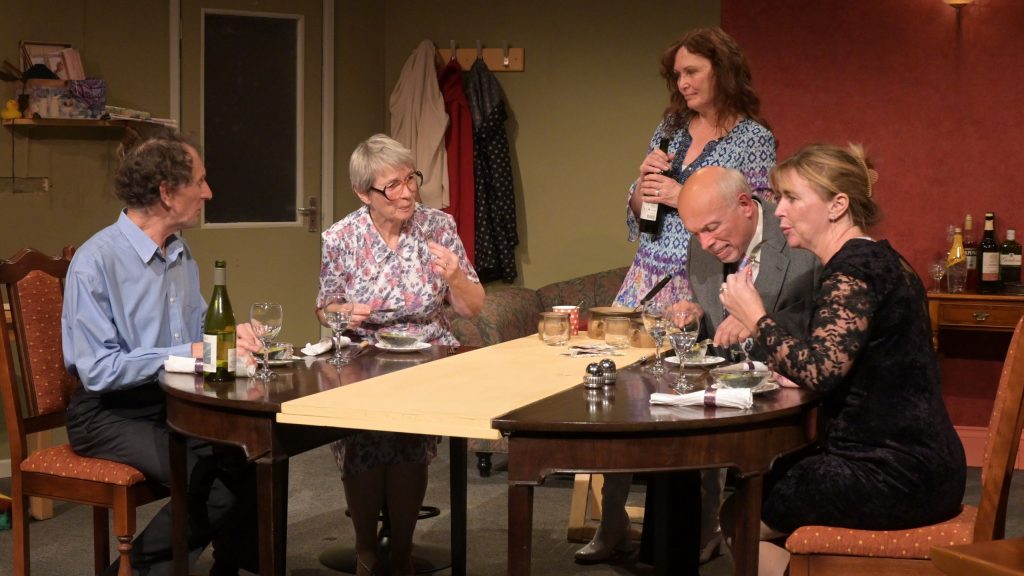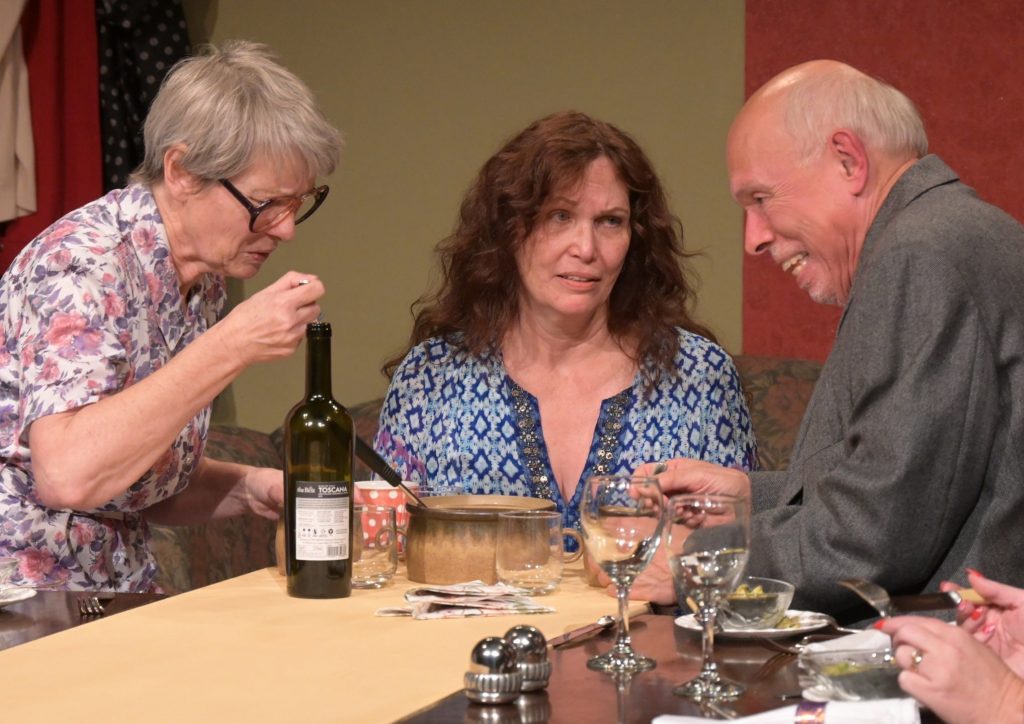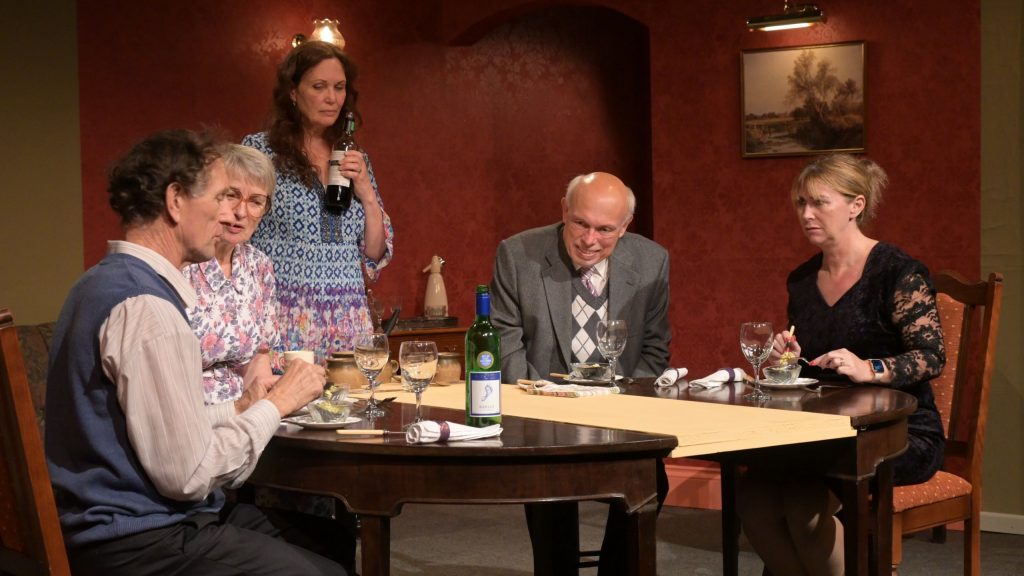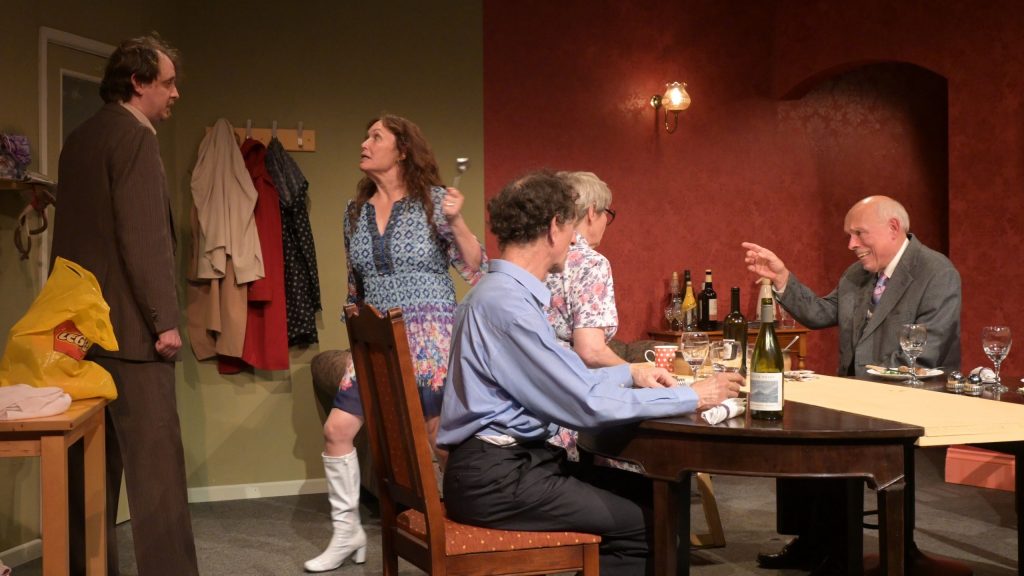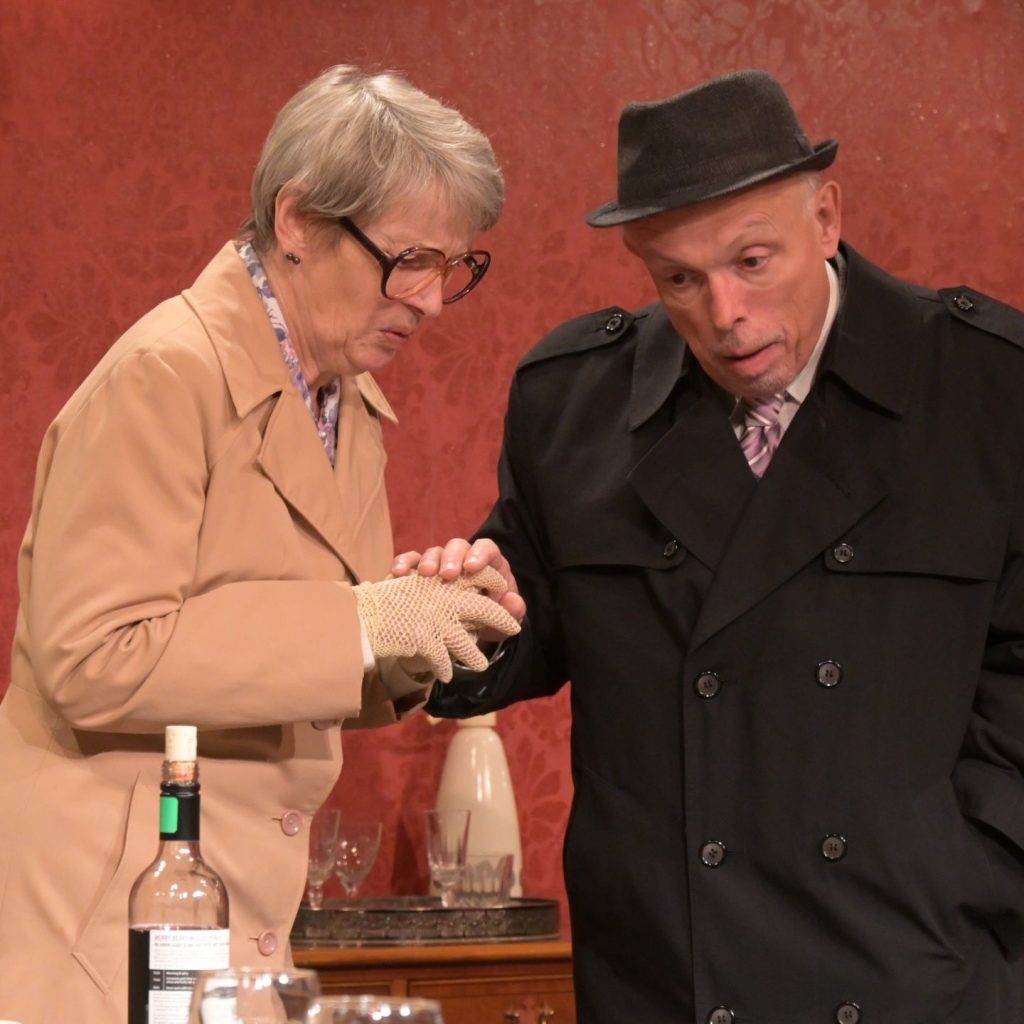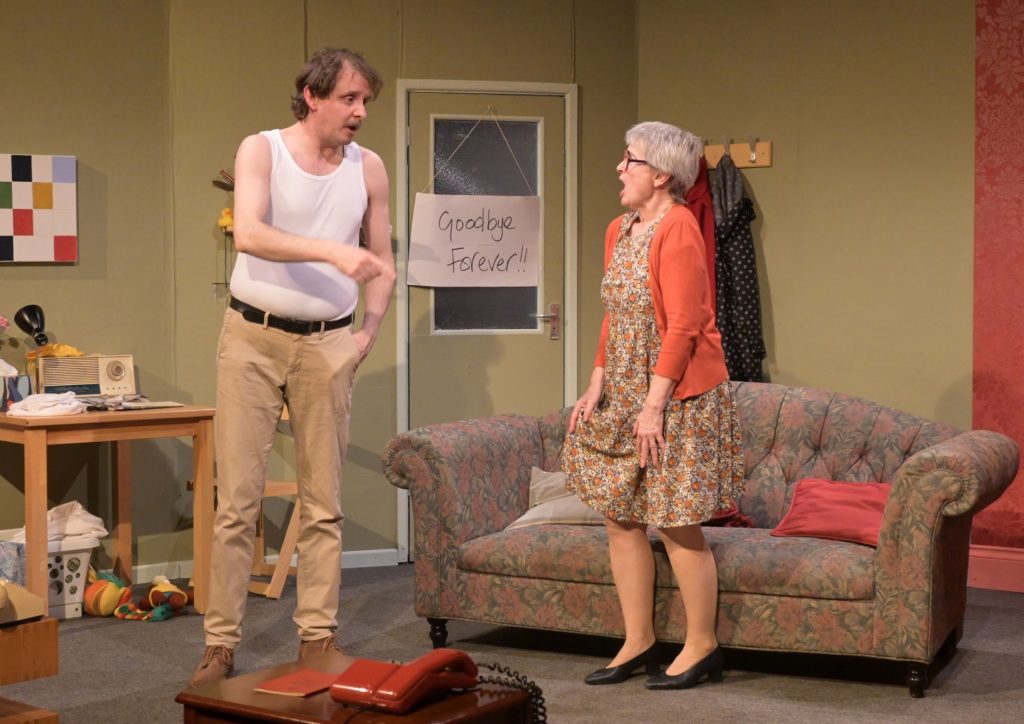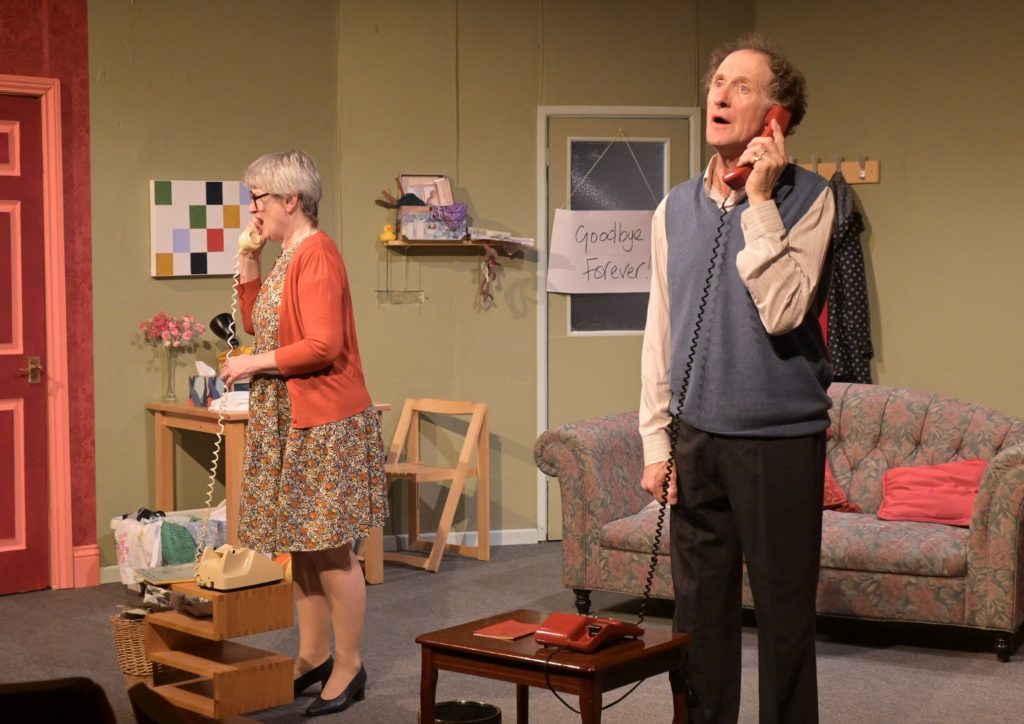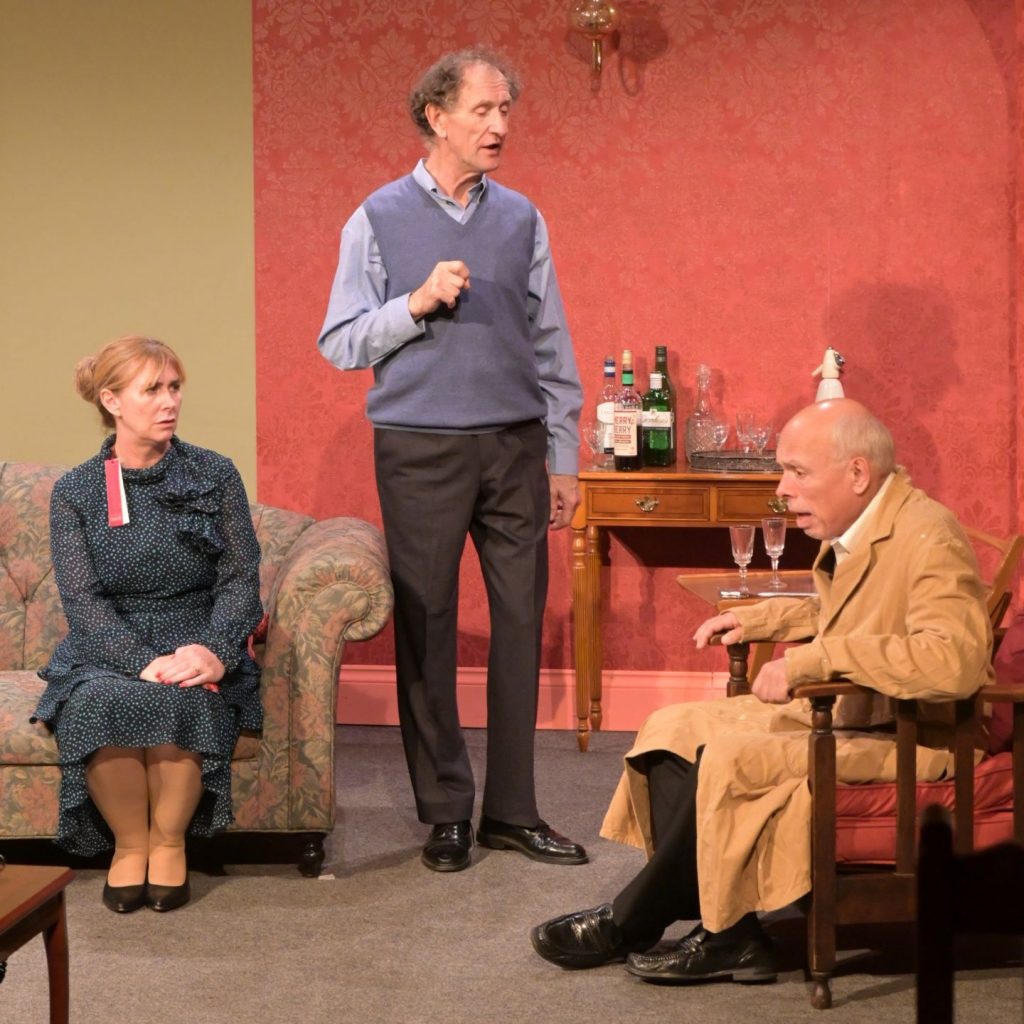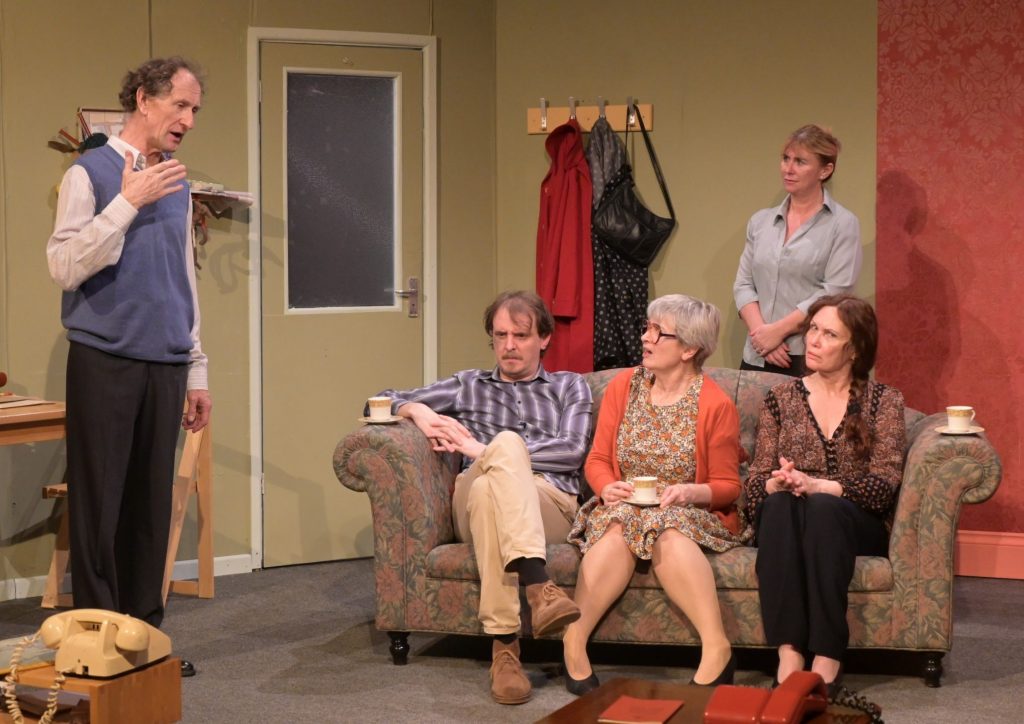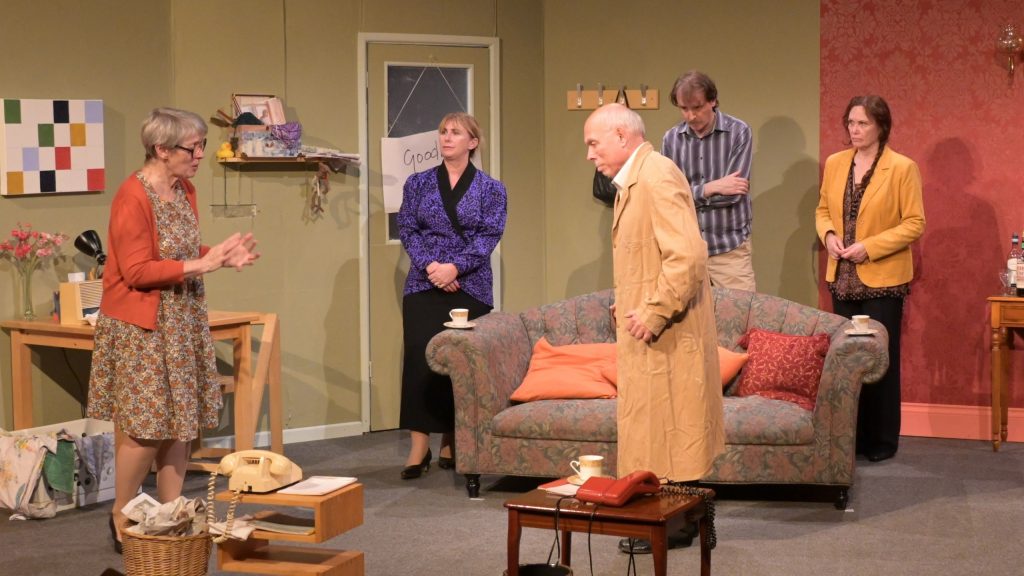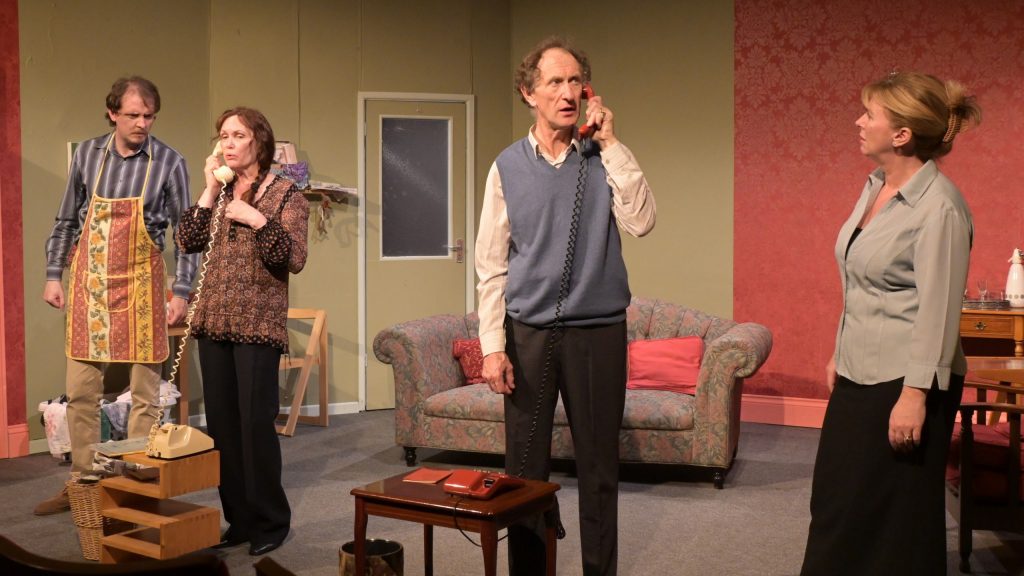Maggie May (The Phoenix Theatre Company
BRUCE WYATT (NODA)
Maggie May, a new play premiered in 2022, tells the story of a family crisis and the strains it places on their son’s romance with his new girlfriend. Above all it’s a love story, laced with music and mixed humour and drama. An excellent production by Brian Jackson captures every bit of that and more.
(left to right: Suzanne Hill, Jane Bovell, Steve Doidge, Lori Weber & Tudor Smoleanu)
The play opens with Maggie (Jane Bovell) getting husband Gordon (Steve Doidge) up and dressed as he recovers from a stroke. They are expecting son Michael (Tudor Smoleanu) soon to arrive for a birthday lunch with new girlfriend Claire (Lori Weber). Michael is now running the family business single handed. Meanwhile Jo (Suzanne Hill) a good friend of Maggie visits, always good for a laugh, but complains that Maggie has been letting her down by not joining in with various activities. Without exception the acting was excellent throughout.
Maggie explains how useful it is to write the odd ‘post- it’ note, as a reminder to do something and picks one up from the floor (One, I wondered if it had been left inadvertently before the play began). But in a later sequence when Maggie reminisces and others on stage freeze, it also becomes clear that for simple routines her memory is not so good, including calling Claire, Emily (an old girlfriend) on several occasions. At the lunch table, Gordon feels now is the time to announce Maggie is suffering from Alzheimer’s disease, news which Michael finds hard to accept. When Maggie explains what it is like to suffer from Alzheimer’s disease, Jane’s acting is superb.
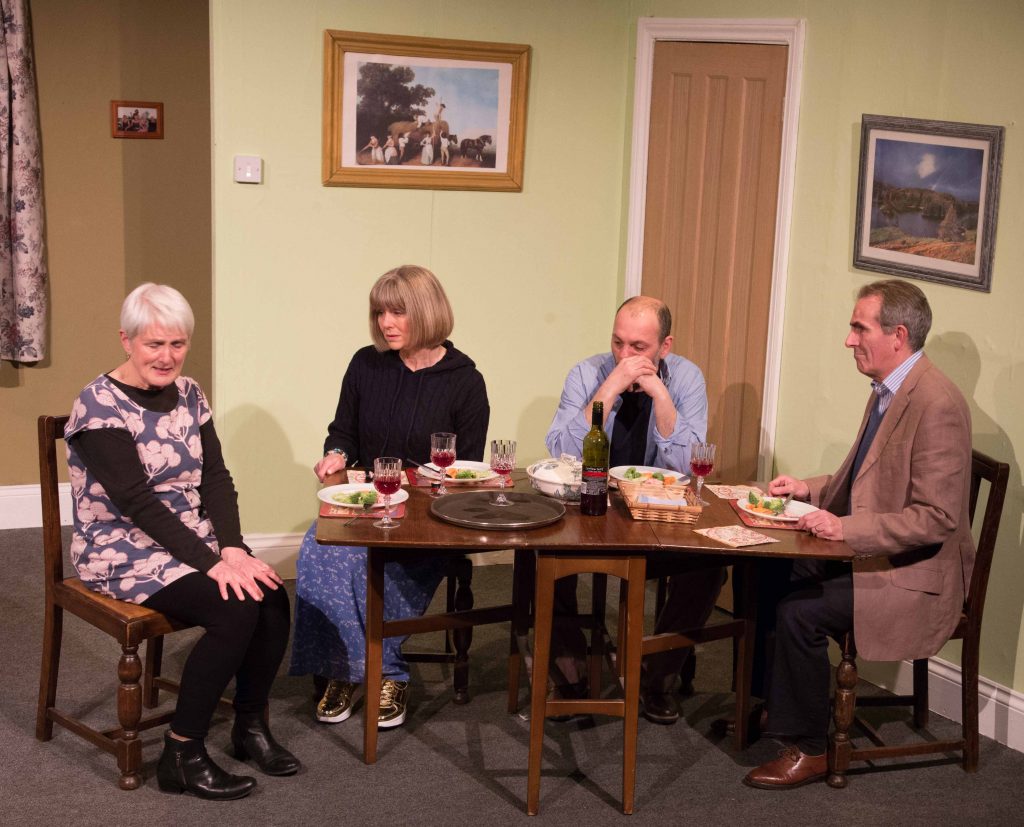 There are some lovely and moving moments when Gordon sings to Maggie who joins in, with the appropriate background music for the song. Their warm relationship together was totally convincing. From suffering an infection, Maggie is in hospital and visited by Jo and Gordon. Maggie realises she had previously upset Jo and although she can’t remember exactly what she said, she still felt bad inside. An absorbing scene so well handled.
There are some lovely and moving moments when Gordon sings to Maggie who joins in, with the appropriate background music for the song. Their warm relationship together was totally convincing. From suffering an infection, Maggie is in hospital and visited by Jo and Gordon. Maggie realises she had previously upset Jo and although she can’t remember exactly what she said, she still felt bad inside. An absorbing scene so well handled.
Scenes switched from one home to another by the simple repositioning of a settee and change of seat cover and cushions. At Claire’s home, Maggie learns that she and Michael had split up, mainly due to Michael’s lack of communication which Tudor acted out convincingly, but Maggie reads out some heartfelt words that she noted he had said about Claire, which clearly explained that he still loved her very much. Claire obviously felt the same way and Lori’s performance earlier as the new girl-friend, and later on was both endearing and compulsive watching.
There was another poignant moment when a large number of ‘post-it’ notes fell from above, when Maggie’s Alzheimer’s disease was put into context.
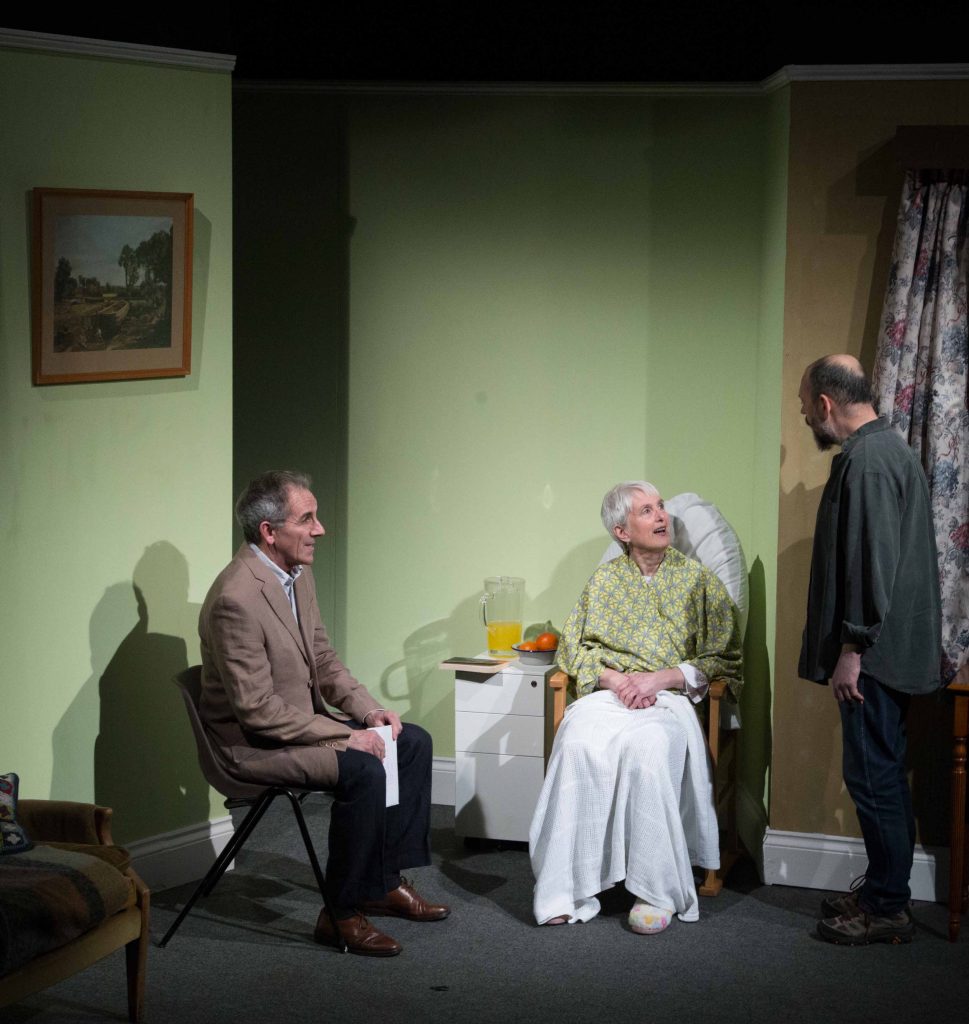 In Act 2 there were a number of what I call ‘moments of (great) theatre’; when Michael left a hospital visit because he could not cope with the situation, Gordon’s understanding for Maggie when she was frightened about the future, a lovely scene when Maggie visited Jo, who gave a very natural performance throughout, another moving moment when Gordon starts to sing and Maggie joins in and a very moving moment when Gordon realises she hadn’t remembered that someone recently mentioned, had died.
In Act 2 there were a number of what I call ‘moments of (great) theatre’; when Michael left a hospital visit because he could not cope with the situation, Gordon’s understanding for Maggie when she was frightened about the future, a lovely scene when Maggie visited Jo, who gave a very natural performance throughout, another moving moment when Gordon starts to sing and Maggie joins in and a very moving moment when Gordon realises she hadn’t remembered that someone recently mentioned, had died.
The staging was also excellent; as usual a well -built set, a variety of lighting effects and music accompaniment that was just right. At the opening of each act, a spotlight on a pair of gnomes embracing each other, set on a sideboard, for me epitomised the warmth behind their relationships that faced adversity but succeeded. Thank you for the warm welcome and an excellent evening of quality acting.
Crazy Horses (The Phoenix Theatre Company)
BRUCE WYATT (NODA)
The action takes place over a period of several weeks in locations on Earth, in Heaven and in Hell. Heaven is in chaos and God shakes things up a bit by swopping roles of the Horsemen, Death and Famine. Unhappy with the idea the Horsepeople meet and scheme to call on Satan to stage a coup.
I would have described the staging as simple, with plain walls and 2 entrance doors at the rear of the playing area, but soon appreciated that with 14 changes in location, parts of the scenery were cleverly hinged, enabling the stage crew to completely change each set including the pictures on the walls. The wait whilst this was done was worth it.
The scene opens in God’s office when the swop is arranged, but it does not go well when Famine (acting as Death) goes to the wrong address – one of many amusing scenes initiated by God (John Spencer), Death (Tony Hearn) and Famine (Steve Doidge). Also involved are Plague played by Jacky Bedford and War played by Phil Field and both add to the action well.
Moving to Satan’s Office we find Satan well played by Nathan Cole (above left), although dressed in tank top and open sandals (with red painted toe nails) he needs his megaphone to sound sinister. We learn that the real power behind the office is Satan’s Mum, also played well by Jenny Spencer (above right).
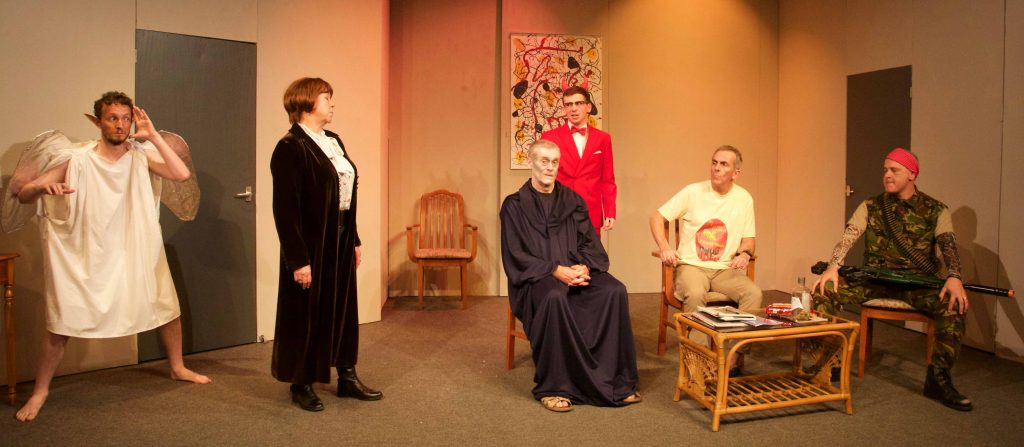 To create havoc, Satan sends Frunk a goblin to meet the Horsepeople, who reckons unconvincingly he can hide anywhere. George Dixon (above left) played this with great characterisation. Great confusion ensues when a cleaner – expressively played by Stephanie Piggott – arrives in God’s common room who the Horsepeople believe is Frunk in disguise.
To create havoc, Satan sends Frunk a goblin to meet the Horsepeople, who reckons unconvincingly he can hide anywhere. George Dixon (above left) played this with great characterisation. Great confusion ensues when a cleaner – expressively played by Stephanie Piggott – arrives in God’s common room who the Horsepeople believe is Frunk in disguise.
Eventually the plot to overturn god fails and in another twist we learn the ‘family’ link between God (below left) and Satan and a proposal for a new 11th commandment!
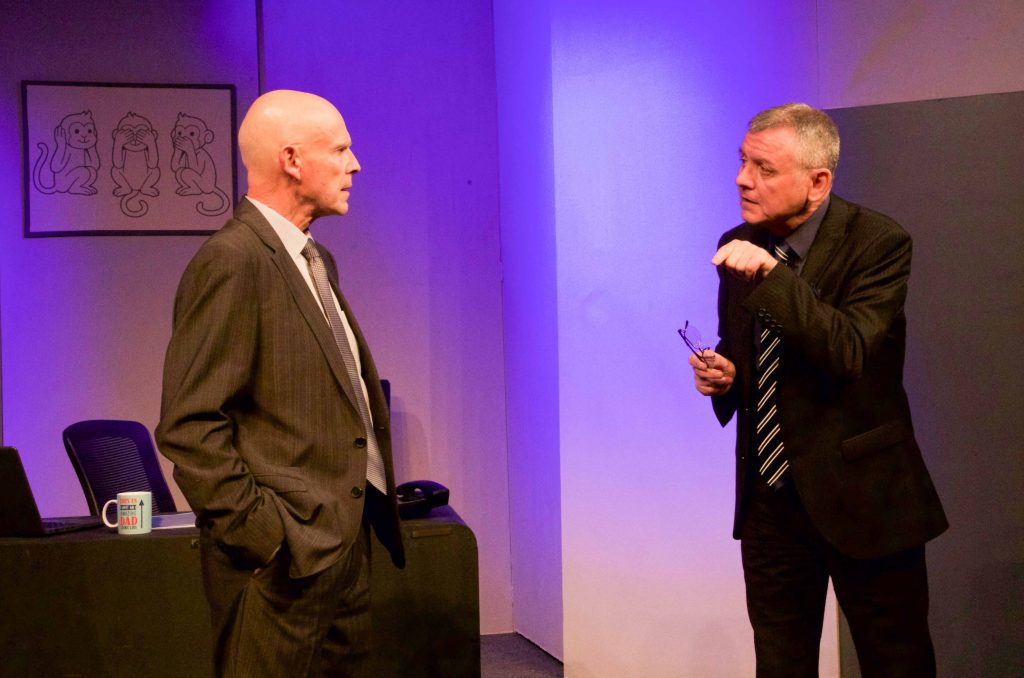 The entire cast were accomplished actors including all in other roles; Graham Isle ( Saint Peter) (above right) Bob Houghton (A Man) and Suzanne Hill standing in at short notice for Renee Field (A Woman) who subsequently was able to return to the role.
The entire cast were accomplished actors including all in other roles; Graham Isle ( Saint Peter) (above right) Bob Houghton (A Man) and Suzanne Hill standing in at short notice for Renee Field (A Woman) who subsequently was able to return to the role.
Congratulations to Director Maurice Thompson and the production team and my thanks for the usual warm welcome.
Anything Goes (Phoenix Theatre Singers)
BRUCE WYATT (NODA)
On a warm June evening the Phoenix Theatre Singers once again served up a concert with a great range of musical and other items, led by the talented duo of Richard Watson accompanist / MD on keyboard and Mary Brigg as MD / Conductor with 21 singers set in front of a sparkling star cloth. Linking some of the sections together MC Michelle Cooper provided a bright narrative and was completely at ease with the role. At a number of opportunities, the cast changed costume to provide a flavour of what was to follow and this was a pleasing result. Richard provided a musical opening of ‘Younger than Springtime’ from South Pacific and the first company number ‘Anything Goes’ was well arranged and sung. In fact, a medley from South Pacific which soon followed reminded us of the beautiful numbers created by Rodgers and Hammerstein. A well- presented contrast was then provided by Sue Nicholson providing an amusing carbon copy of Pam Ayres ‘The Make Up Lady’. John Spencer and Derek Lunt sang ‘Well Did You Evah’ by Cole Porter and the ‘Rhythm of Life’ that followed providing some nice part singing.
The company then staged a very smooth and satisfying version of ‘Whistle Down the Wind’ and the men sang ‘Pretty Women’ who certainly perked up when one arrived courtesy of Michelle! Elaine Tomlins, Jenny Spencer and Suzanne Hill then sang a very funny ‘Always a Bridesmaid’. Mary Brigg sang ‘In the Wee Small Hours of the Morning’ with great feeling and Richard provided some great accompaniment. Jayne Lunt and Natalie Smith provided good support throughout the act which concluded with a great Jersey Boys medley.
Act 2 opened with a very nice ‘Ascot Gavotte’ from My Fair Lady with the company suitably attired and Owen Fitzpatrick sang ‘Somewhere’ from West Side Story with a great deal of sensitivity which I enjoyed. The Best of Bond medley provided some nice light and shade and again was very well accompanied by Richard. This number introduced a rich vein of numbers; Sandy MacNeill singing an excellent ‘Lady Marmalade’ by Patti Labelle, Mary and Richard singing ‘A Song That Goes like This’ from Spamalot, followed by Michelle singing ‘Me and The Sky’ from Come from Away with great feeling. John Spencer also sang ‘I Won’t send Roses’ with great sensitivity and Andy Doyle provided a great effort singing ‘This is the Moment’ from Jekyll & Hyde.
Along the way the Company sang a medley from Godspell and the ladies united, singing ‘My Guy’ from Sister Act, and Jacky Bedford provided a smooth version of ‘Learnin’ the Blues’. The company proved why we sing, with a number of the same title and the audience were invited to join in with the finale ‘All You Need is Love’, concluding the concert that deserved a bigger audience. I would like to thank members for their usual warm welcome.
Murder in Company (Phoenix Theatre Company)
BRUCE WYATT (NODA)
The setting is a village hall where a dramatic society are rehearsing a mystery thriller. The rehearsal proceeds with a number of difficulties until a mysterious death brings the situation to a head. The Phoenix Company brought to life a cleverly written dark comedy, in which almost everyone could have been the murderer. The audience are met by a good-looking village hall set, epitomising a well-used facility, typically perhaps in need of a little TLC.
Arriving early to the rehearsal are Alan (Tom Lee-Hynes) and Margaret (Jane Bovell) who appear to be having an affair, he expressing his love for her, she expressing some regret and that it must end. Both provided a powerful opening and in fact each player that followed had at least one equally powerful or moving stand out speech during the performance.
Ted the new caretaker was well played by Alan Chacon, a busybody stickler for the rules who had an apparent habit of eavesdropping on the conversation before making each entrance, including several interruptions of the rehearsal, hence a heavy suggestion that he could easily blackmail the two lovers. Margaret’s husband Philip was a rude blustery bombastic director of their play and Les Davis captured the character well, turning into a Hercule Poirot character later on trying to solve the mystery death.
(Jane Bovell & Alan Chacon)
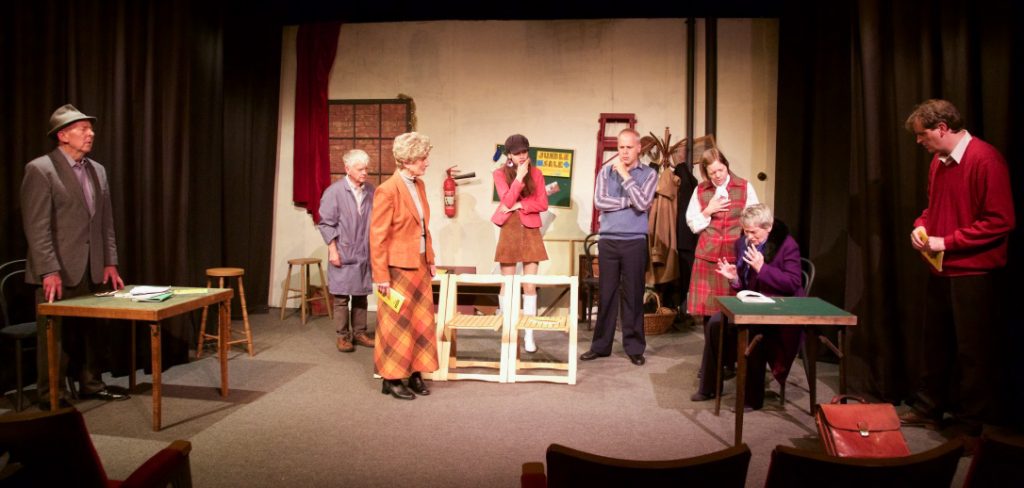 (left to right): Les Davis, Alan Chacon, Jane Bovell, Mia Field, Phil Field, Lucy Davies, Amanda Barrett & Tom Lee-Hynes
(left to right): Les Davis, Alan Chacon, Jane Bovell, Mia Field, Phil Field, Lucy Davies, Amanda Barrett & Tom Lee-Hynes
We meet Phoebe also well played by Lucy Davies, who we discover knew Ted the new caretaker from a long time ago and her eventual explanation of how Ted was basically to blame for her son’s death was excellent. Doris (Amanda Barrett) was late to the rehearsal because she had been attacked on the way and suspicions are raised that Philip was he attacker as she was still holding a scarf belonging to him, that she managed to grab during the attack. Amanda’s scene with Alan when he looked to settle her and they shared a bottle of brandy was played with a natural ease.
Phil Field as the play’s stage manager Ronnie, was excellent, a somewhat light-hearted mischievous character and the bench routine (above) when ‘standing in’ was very funny. His final speech in Act 3 when at first entering worse for drink and then breaking down, was very well handled and moving. Mia Field as Patricia, the youngest in the cast, who earlier found the body and had doubts about the coroners verdict that it was accidental death, also displayed great strength, when explaining that it was too stressful to continue taking part in the play and with 2 weeks to go wanted to leave the cast.
Prior publicity for ‘Murder in Company’ confirmed that it was Ted the caretaker that was murdered, but my lips are sealed as to who did it! This was a well written piece by Philip King and John Boland, well directed by Renee Field which demonstrated a depth of experience in the whole company. Congratulations to all involved.
Venice Revisited (Phoenix Theatre Company)
PETER HALL & BRUCE WYATT (NODA)
The idea of a production of “The Merchant of Venice – The Musical”, may seem problematic to many. The purists may ask why you would want to meddle with such a Shakespearean classic; musical theatre fans may shy away from Shylock having been force fed the Bard in their youth, whilst drama lovers may fear a saccharine Von Trapp interpretation of the Play. Theatregoers fear not.
The Phoenix Theatre Company under writer and director Richard Elgood in collaboration with composer Richard Watson, have presented the world premiere of “Venice Revisited”; an uninhibited review of the Play. Whilst being true to the plot, “Venice Revisited” does something that Shakespeare was unable to do due to the strong antisemitic sentiment of his time: it puts Shylock centre stage and gives him a background, a future and humanity. We see how he hurts and how he bleeds and characters merely mentioned by the Bard are fleshed out and new relationships explored.
The audience are drawn into an Elizabethan world by subtle lighting, a versatile minimalistic set and props, and are readily whisked from Shylock’s den to Belmont to courtroom. Accompanist Richard Watson sits at his piano stage right and plays his vibrant scores that dramatise, animate and draw out the plot. La Zingara – the story teller – played by Sandy MacNeill, delightfully keeps us abreast of the tale.
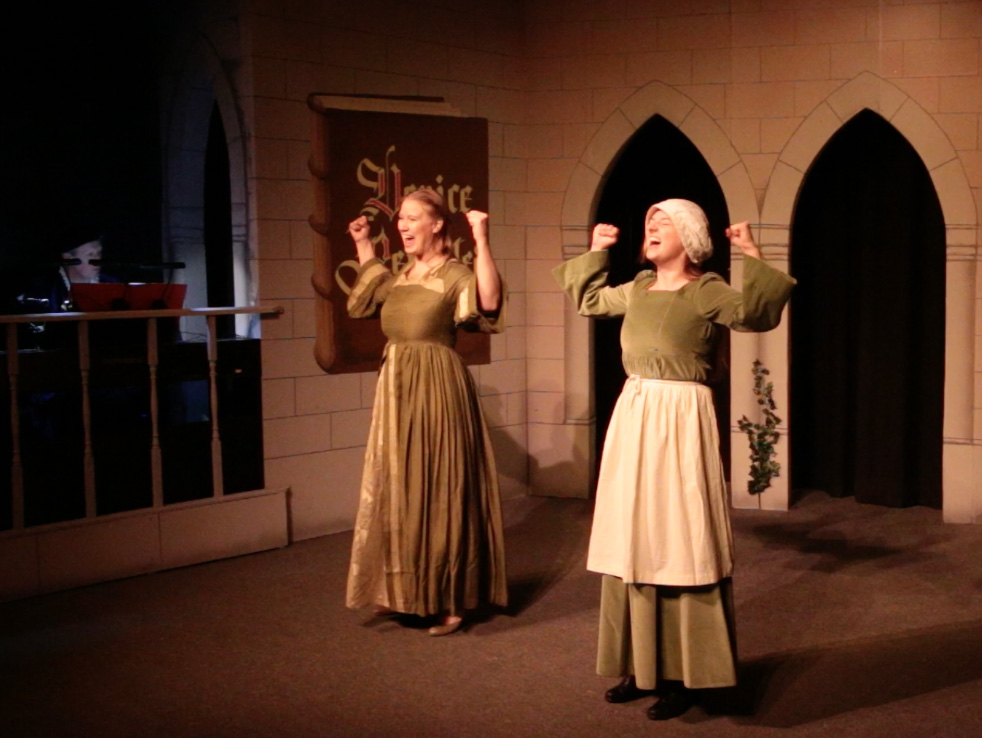
left to right: Michelle Cooper (Portia) & Lauren Crouch (Nerissa)
The principal players are outstanding: Michelle Cooper is a joy as Portia and superbly interprets her part in either singing or dramatic roles. Her duet “Just Like Men” with Nerissa, played by the talented Lauren Crouch, is a high point of Act One (see above). Stacey Thornhill also holds the stage and displays her vocal flair and feisty determination as Jessica. Tony Hearn plays the eponymous merchant – Antonio. He is confident, bonhomie, assertive and yet contemptuous, and draws out the hatred between Christian and Jew. Portia’s suitor – Bassanio, played by Andy Doyle, is suitably lovesick and dependable and his duet with Portia “Locked in the Locket of My Heart” is enchanting.
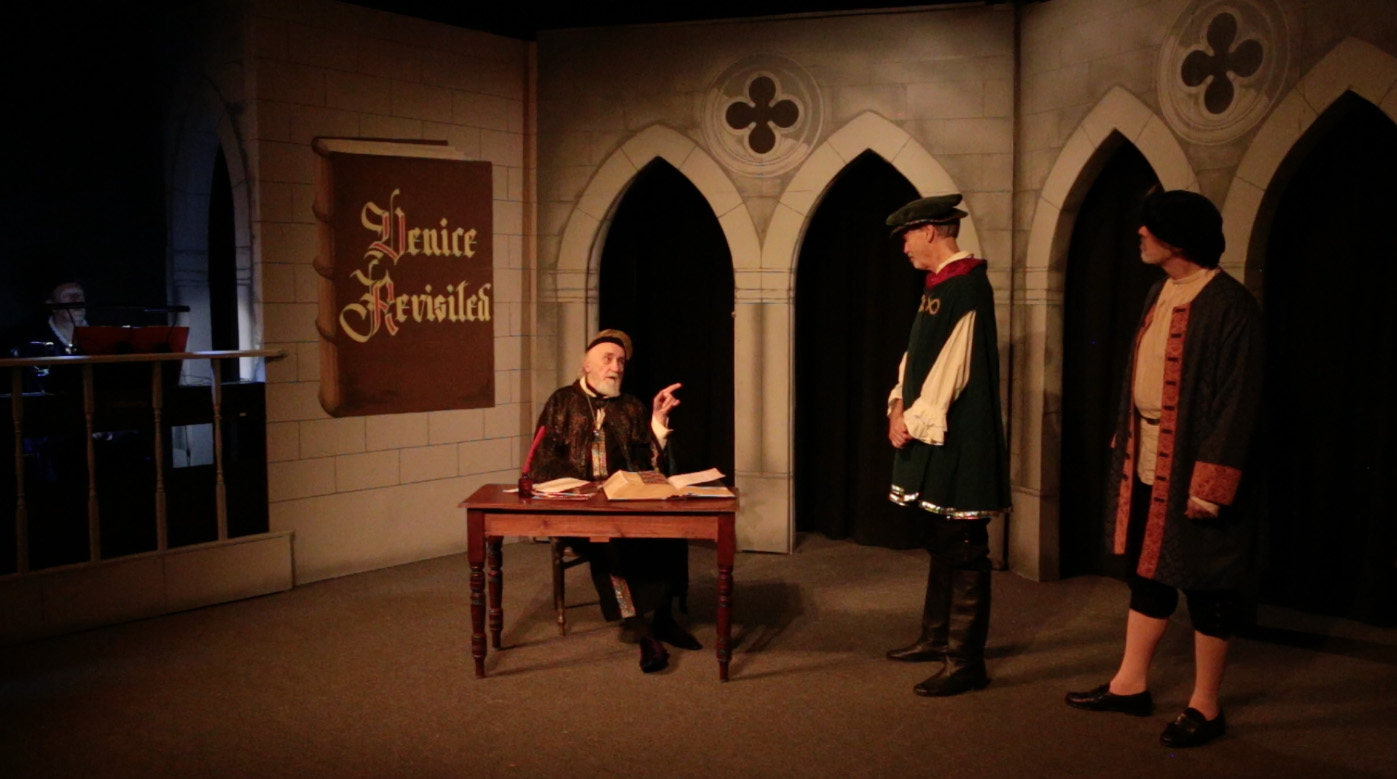
left to right: Brian Jackson (Shylock), Tony Hearn (Antonio), Andy Doyle (Bassanio)
At the heart of the plot is Shylock. Brian Jackson captures the essence of the man: his avarice, inflexibility and spite, and yet an underlying vulnerability that has witnessed love and disappointment. Shakespeare left him despised and destitute but we can now envisage another path if circumstances and religious bigotry were different. Richard Elgood explores the possibilities and proves that reconciliation is possible and – to the audience’s satisfaction – love conquers all.
Peter Hall
I had the pleasure of attending “Venice Revisited”, a new musical written by Richard Elgood and Richard Watson, which was in effect a reworking, updated in some respects, of “The Merchant of Venice” by William Shakespeare. Briefly, Shakespeare’s version involves Antonio, an antisemitic merchant, who takes a loan from the Jew Shylock to help his friend to court Portia. Antonio can’t repay the loan, and without mercy, Shylock demands a pound of his flesh. The heiress Portia, dresses as a lawyer and saves Antonio. In this reworking, the story is retold but we are invited to feel a greater level of pity for Shylock in his chance to redeem himself. We are also reminded of the grubby trade background of Venice.
The fixed well-built and painted set was impressive, mainly consisting of 6 archways, 4 central and one on either side of the stage, in one of which the piano was located behind a low fence. Centre stage stood a raised coffin. When the scenes switched from Belmont to Venice and vice versa, one side (2 arches) was cleverly folded back and forth to recreate the set for each location. Throughout, the music written and played by Richard Watson on piano was excellent and at times haunting, befitting the piece. The costumes were excellent, well-fitted and well-carried by the cast.
The story is linked together by La Zingara, played with great clarity and strength by Sandy MacNeill (above) who also demonstrated an excellent voice in Act 2 with “A Father’s Bond of Blood”. The ensemble of lawyers made their mark singing “Letter of the Law” with conviction and we soon learn that the coffin did not contain Portia’s real father, as she thought, but another. This scene was handled well by her mother Leah played by Jacky Bedford and her grandmother played by Stephanie Piggott.
Portia was played by Michelle Cooper and maintained a great often bright personality throughout, full of feeling as well as some expressive singing, not only with Nerissa, well played by Lauren Crouch, (especially ‘Just Like Men’) but later with Bassanio (Andy Doyle) who had to overcome all manner of problems to eventually win his bride. Andy fulfills the role with great strength and poise and when he looses all his money is forced to seek a loan from Antonio sympathetically played by Tony Hearn. This has to be facilitated via Shylock who agrees to the loan, although for failure to repay it, he would literally seek a “pound of flesh” from Antonio. Brian Jackson as Shylock provided an excellent characterisation, initially the villain, but latterly a more understanding human being and his final speech in Act 2 was moving.
Shylocks daughter Jessica played by Stacey Thornhill yearns for a husband and has an eye for Lorenzo played by Tudor Smoleanu, and both fulfill their respective characters very well, the latter often with great energy (see overleaf). In fact there was no weak link amongst the principals with Maurice Thompson (Lawyer/Duke) and Steve Doidge (Gratiano) providing full support, together with a busy ensemble. I felt throughout, the dialogue was taken at just the right pace in a style that was meaningful and credit must be due to the writing of Richard Elgood. Full of admiration, I conclude this new production deserves to be experienced more widely.
Bruce Wyatt (NODA)
Christmas with the Phoenix Theatre Singers
BRUCE WYATT (NODA)
Set against a sparkling star back-cloth, 14 ladies in their signature black trousers and red tops and gents in their DJs with red bow ties, presented an interesting range of Christmas related songs blended together by MD Mary Brigg, which put everyone in a great seasonal mood. After Michelle Cooper gave a warm opening welcome, the full chorus presented three songs including the traditional spiritual number ‘The Virgin Mary had a Baby Boy’.
Elaine Tomlins presented an amusing poem ‘Twas The Night Before Christmas’ which reminded us of the toy makers pact to keep parents busy assembling toys, and to find in many instances batteries are not included! Sandy MacNeill sang ‘The Man With The Bag’ with some great expression and this was followed by some nice part singing by the ladies in ‘Angels Carol’ by John Rutter.
Rita Bingham gave us a traditional carol ‘Bethlehem’ and Mary Brigg and Richard Watson who was relieved of the piano by Jayne Lunt, gave us a great version of ‘Baby Its Cold Outside’ which was very well received (and true!). Sue Nicholson presented us with her very amusing Pam Ayres version of ‘Once I was a looker and so was my spouse’ and Part 1 concluded with the full chorus singing Peter Gritton’s ‘Follow That Star’.
The audience was invited to savour some mince pies in the interval, for a donation to the Ross Lions Christmas Lunch Appeal for which the Phoenix Theatre was raising funds to help the lonely and vulnerable at Christmas time.
Part 2 opened with a melodic ‘A Rhapsody of Christmas’ concluding with ‘Silent Night’ and this was followed by a very nice version of ‘I’ll be home for Christmas’ sung by Julienne Reeves, with some great accompaniment by Richard. Suzanne Hill gave a very funny short version of ‘Cinderella’ the panto, covering just about all the main characters with a quickfire use of 7 hats!
The gentlemen then presented ‘Drummer Boy / Peace on Earth’ and the chorus sang a very nice ’When a Child is Born’, with lead vocalist Margaret Harnett. Jacky Bedford and Natalie Smith sang ‘Mary Did You Know’ and after their gentle rendition of ‘The Lamb’ the chorus upped the tempo with ‘Jingle Bell Rock’. Michelle sang ‘Snowman’ with great feeling and the concert was rounded off with the full chorus singing Boublil & Schonberg’s ‘Bethlehem’ and then ‘Merry Christmas Everybody’. There was just time for two carols when the audience joined in and its pretty certain everyone went home happy.
I’d like to thank the Phoenix Theatre for some great entertainment this year and look forward to more in 2023.
How The Other Half Loves (Video Recording & Play Photos)
GRAHAM RUSSELL (director)
To view a video recording of “How The Other Half Loves”, please see the links below to the scenes of the play:
Act 1 Scene 1 (Early Thursday morning)
Act 1 Scene 2 (Thursday and Friday evening)
Act 2 Scene 1 (Saturday morning)
Act 2 Scene 2 (Sunday morning)
Play photos by Ian Godsave:
How The Other Half Loves (NODA review)
Bruce Wyatt
By Alan Ayckbourn, this classic play was first performed in London in 1970 and also first performed at the Phoenix in 2005. It features the lives of three couples all linked by their husbands working for the same company; Frank & Fiona, Bob & Teresa and William & Mary. The play revolves around misunderstandings by Frank (the boss) as to the reason why his wife and Bob were both out late one morning till 2am and they both used William & Mary, unknown to them, as their alibi. Subsequently William & Mary get invited to dinner by the other couples, albeit on separate evenings.
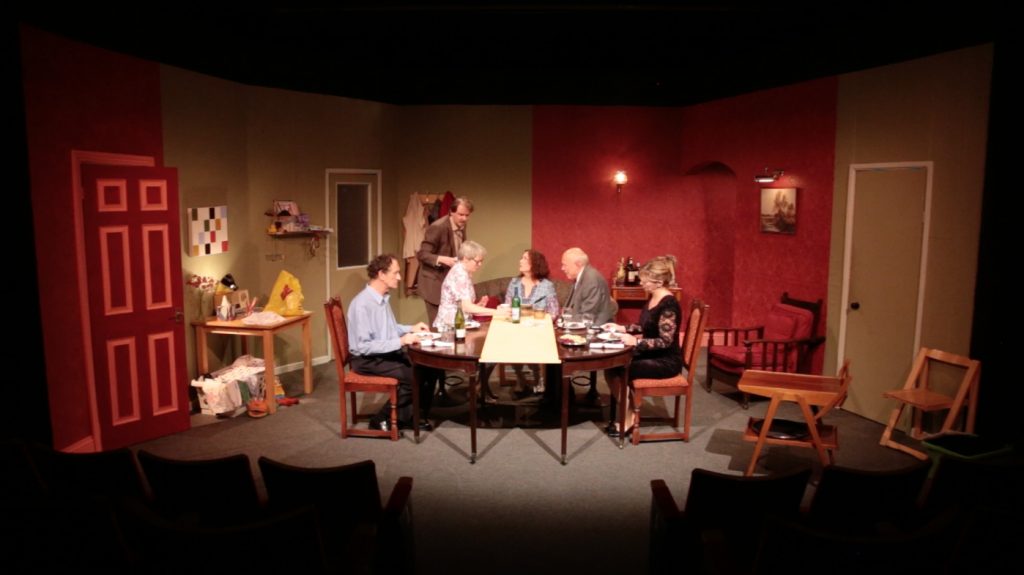 The clever set was a permanent but split scene depicting the homes of both Frank and Bob and with great timing, both halves of the set were used often at the same time, by all the players. The set was busy with appropriate furniture and props and all the cast were well dressed. The colour and style of the furnishings indicated which space belonged to which home.
The clever set was a permanent but split scene depicting the homes of both Frank and Bob and with great timing, both halves of the set were used often at the same time, by all the players. The set was busy with appropriate furniture and props and all the cast were well dressed. The colour and style of the furnishings indicated which space belonged to which home.
Frank the boss of both the other men, is a somewhat rambling confused and forgetful character who quickly but innocently comes to the wrong conclusion, whilst his wife Fiona is a smart attractive lady exasperated with him and who rather guiltily tries to divert attention away from her late night out. Both are played very convincingly by Robin Haig and Alison Clarke.
Bob and Teresa (Tom Lee-Hynes and Lynne Casey), live in a less salubrious home and are clearly suffering from the pressures of bringing up their youngster. Teresa particularly struggles at home all day whilst Bob is in the office. You can feel the tension between them, and are rather dishevelled in manner and appearance as a consequence. Again, both provide a realistic performance.
As a result of both Fiona and Bob suggesting as part of their respective alibi, that William & Mary have their own marital problems, Frank and Teresa coincidentally feel it might help them to talk if they are invited to dinner. This was a most impressive scene when William (Steve Banner) and Mary (Amanda Barrett) are sitting with both hosts at the same table, centre stage, but swivel their seats from one meal to the other, sometimes with just one line apart, whilst the non-hosts maintain a freeze. William is a ‘Jack of all trades’ with a somewhat overbearing approach to matters, well played by Steve, and Mary is a rather nervous apologetic character which Amanda maintains well throughout.
In Act 2 further confusion arises, often due to Frank. With just a few small glitches, speed is maintained throughout and the timing of entrances and exits were spot on as the players often crossed each other (in their respective homes) but I felt one’s attention was always where it should be. This must have presented a minefield for director Graham Russell, but was achieved with a great level of success. The cast received a good ovation at the conclusion of the first night and as the run continues I hope they all feel they can smile back as a result – they deserve to.
I would like to thank the Phoenix for their usual warm welcome and look forward to “Christmas with the Phoenix Theatre Singers”.
How The Other Half Loves
PETER HALL
Class, sex, and relationships are the themes of Alan Ayckbourn’s classic comedy farce “How The Other Half Loves” now showing at the Phoenix Theatre. The play makes demands on director, actors and set alike as the action and characters move through time and place on the small stage divided by décor and furnishings. Ayckbourn takes us back to the early 70s and introduces us to three couples linked through work: Frank and Fiona Foster – upper-middle class in a tired marriage; Bob and Teresa Phillips – in a chaotic and tempestuous relationship, and the Featherstones – William and Mary – who are the unwitting alibis for the clandestine relationship between Bob Phillips and Fiona Foster. Robin Haig commands the stage and is wonderfully fussy and bumbling with a calculated vagueness as Frank. This contrasts with his dismissive, sophisticated and unfaithful wife Fiona, delightfully played by Alison Clarke. Alison displays a comical talent for contradicting everything she says by facial expression leading to amusing misunderstandings and mayhem. Both Tom Lee-Hynes as Bob, and Steve Banner as William, have challenging roles: Bob is an engaging but abusive chauvinist, whilst William is a dim controlling bully. Both pull off these roles despite portraying attitudes towards women that are of their time. Lynne Casey plays Teresa – Bob’s long-suffering wife. She captures the militancy and frustration of motherhood when faced with a flippant and cheating husband. Amanda Barrett also has a gem of a part as Mary. At first meek and timid and full of coy mannerisms, we see her amusing transformation throughout the play. To test their spouse’s alibis, Frank and Teresa invite the Featherstones to two separate dinner parties in two different homes on consecutive nights, but the action runs simultaneously on stage. Graham Russell’s direction captures Ayckbourn’s brilliance. He tightly choreographs the six actors as they move from ‘active’ to ‘inactive’ roles and the dialogue and movement are precisely synchronised as the bewildered Featherstones hilariously swivel from one dinner party to the next. To achieve this precision, the direction, stage management, lighting, sound and set, all have to excel – and they do. The Phoenix Theatre Company have a hit on their hands and are playing to packed houses. The play runs from Saturday 19th to Saturday 26th November. The stagecraft and laughter starts at 7.30 pm.
A Hundred Years of Song (NODA review)
Bruce Wyatt
Acknowledging the 100th anniversary of the Phoenix Theatre which originated with the Ross Operatic & Dramatic Society, the Phoenix Theatre Singers provided a fitting tribute to the occasion by presenting a wide-ranging concert with popular songs throughout the period. We were reminded of the huge amount of work and fund raising that took place over many years culminating in the transformation of a former fire station to the beautiful and intimate Phoenix Theatre we have today. The concert was devised and led by the musical director Mary Brigg with other introductions by Michelle Cooper and Di Hughes.
The stage was organised in concert style with two rows of chairs on raised platforms, backed by a star cloth and the players were attractively dressed; ladies in red and black whilst the gentlemen sported DJs with red bow ties.
With 26 sections in total it will be difficult to mention them all here. However, the concert took off with the full chorus singing ‘Another Op’nin Another Show’ from Kiss Me Kate, with an early opportunity to harmonise which was continued well throughout the concert. This was followed by a great medley from Irving Berlin’s ‘Rags to Ritz’ including ‘Play a Simple Melody’, ‘Blue Skies’ and ‘Puttin on the Ritz’. ‘Yours’ sung by Di Hughes was poised and sensitive and a tribute to the Everley Brothers was well received along with Natalie Smith’s ‘Call Me Irresponsible’.
The audience also enjoyed a reminder of ‘On My Lips Every Kiss Is Like Wine’ (Franz Lehar) sung by Mary Brigg with amusing interaction with Richard Watson on piano, Victor Borge style. The chorus’ ‘Rock around the Clock’ went with a real swing and perhaps the biggest ovation during Part 1 was reserved for Emma Lewis and ‘Moon River. Part 1 concluded with Phoenix’s own Beverley Sisters: Suzanne Hill, Margaret Harnett and Lyn Smith complete with armography and another great chorus number ‘Thank You For The Music’ by Abba.
For Part 2 the ladies changed into a very smart selection of evening wear and the full chorus started with a medley from ‘West Side Story’ which reminded us what a fantastic score it has. Jacky Bedford sang ‘Love of My Life’ (Queen) with great feeling, followed by the chorus with ‘Seals Lullaby’ with more gentle harmonies. Part 2 actually consisted of one great number after another with an impressive selection from Gershwin and to add some variety, Sue Nicholson gave us an excellent and amusing portrayal of Pam Ayres poem ‘In Defence of Hedgehogs’.
Julienne Reeves provided a very tuneful and controlled ‘May Each Day’ and was joined by Andy Doyle for a beautifully sung ‘If I Loved You’ from ‘Carousel’. More super harmonies in ‘If I Fell’ by Lennon and McCartney and this was followed by Michelle Cooper’s excellent ‘She Used to be Mine’ from ‘Waitress’. Owen Fitzpatrick gave a cool rendition of ‘I’ve Got You Under My Skin’ (and looked cool too in his white tuxedo) and the concert concluded with a tribute to Queen.
A thoroughly good evening’s entertainment and a fitting tribute to 100 years of the Ross Operatic & Dramatic Society and its successors The Phoenix Theatre.

Relative Values by Noel Coward (NODA review)
Bruce Wyatt
Theatre goers who are familiar with the output of the Phoenix Theatre Company will know that their last major production – ‘The Lady Killers’ – was curtailed after one performance due to COVID. However, after two years, they are back with a production of Noel Coward’s 1951 light comedy ‘Relative Values’; it has certainly been worth the wait. Under Amanda Barrett’s direction, the cast explore the mores of English aristocratic society and how they face the perceived encroachment of socialism and brash interlopers from ‘Tinseltown’. Set in Marshwood House, the seat of Countess Felicity, this three-act play amuses and provokes as Felicity longs for the return of the old order where everyone knew their place in society and kept to it. Suzanne Hill delightfully captures the essence of the conniving Felicity and the family and staff pressures that beset her. Steve Banner plays Crestwell, the loyal, stentorian butler, who radiates an air of superiority way above his station. Lucy Davies is wonderfully moody and versatile as Moxie the lady’s maid with a family secret. That secret threatens to derail the engagement between Felicity’s son Nigel, the pompous rather vacuous Earl – performed by Robin Haig – and Hollywood actress Miranda Frayle. To complicate matters further, Miranda’s former beau Don Lucas – played with suitable Hollywood glitz and folksiness by Les Davis – arrives at Marshwood House. Corinne McClune endows the beautiful Miranda with a veneer of New World grace and charm which masks her mendacity and determination to snare her man. The canny Felicity recognises this mismatch and convinces Don that all is not lost. Others attending the house party are Felicity’s nephew Peter, played with affectation and wit by Tim Betts, and Admiral and Lady Hayling who Bob Houghton and Ann Stirrup invest with suitable ‘upper crustiness’. Jacky Bedford is the star struck maid at the bottom of the pecking order. The décor, the costumes and attitudes take us back 70 years, so sit back and watch the clash of cultures, laugh at the prejudices, and hope normal service will be restored as soon as possible. This delightful play runs from Saturday 19th to Saturday 26th March at the Phoenix Theatre at 7.30pm. Come along and enjoy a smile, a whiff of ‘50s nostalgia and a clash of the classes.

Relative Values by Noel Coward
Peter Hall
It was a pleasure to visit The Phoenix Theatre in Ross on Wye and receive a warm welcome from the Company. ‘Relative Values’ by Noel Coward set in 1951, is a comedy of manners and deals with the issues of class and status which highlight a clash of cultures between Hollywood stars and the English aristocracy.
The audience was met with an excellent looking set suitably dressed with appropriate furniture and props, depicting a living room in the Marshwood household. We first meet ‘Crestwell’ the butler, a housemaid ‘Alice’ and ‘Moxie’ the long-standing personal maid to the ‘Countess of Marshwood’. Steve Banner as the butler was everything you could hope for in a first-class butler, anticipating the next move, a soul of discretion with the family and often direct with the other staff. An excellent all- round portrayal. ‘Alice’ was also well played by Jacky Bedford often requiring a chivvying by ‘Crestwell’. ‘Moxie’ played by Lucy Davies was also a very proper household servant of over 20 years and would have gladly remained so, but for the news of an imminent new arrival in the family of the Earl of Marshwood’s fiancé. I could really feel her anxiety and mixed feelings, so well portrayed by Lucy.
‘Felicity’ the Countess of Marshwood [right in photo] cemented the action throughout and this was an excellent performance by Suzanne Hill. She is trying to accept the social changes that are taking place around her, but ultimately doesn’t and feels that her son is marrying beneath his class. Suzanne’s expressions, speed of delivery and timing were spot on. Son ‘Nigel’ (The Earl of Marshwood) insists he and his American fiancé are very much in love, but has a reputation. Robin Haig gave a convincing performance and so too did his intended ‘Miranda Frayle’ (Corinne McClune) [left in photo] who swept in with apparent sensitivity but was economical with the truth. She is pursued by ‘Don Lucas’ an old American boyfriend who turns up unannounced. (Les Davies). Both Corinne and Les had great accents and were convincing.
The principal line up had great depth and the supporting roles of ‘Lady Cynthia Hayling’ (Ann Stirrup), ‘Admiral Sir John Hayling’ (Bob Houghton), and ‘The Honourable Peter Ingleton’ (Tim Betts) were all well played each with a very natural performance. All the cast were impeccably dressed and carried themselves with class. Then, this was a class production by Amanda Barrett.
Thank you for the opportunity to attend and I also congratulate The Phoenix Theatre on reaching its centenary this year.

The Ladykillers
Peter Hall
Anyone who has seen the 1955 Ealing comedy ‘The Ladykillers’ with its stellar cast of Alec Guinness, Herbert Lom and Peter Sellers, might have wondered if this dark British comedy could successfully be brought to the stage. The answer is a definite “yes”. Under the direction of Tom Lee-Hynes, the Phoenix Theatre Company’s latest production of Graham Linehan’s adapted stage play, captures the absurdity of a band of criminals – masquerading as a string quartet – boarding with a sweet, elderly landlady by the railway. With a lot of the cast on the stage at any one time, and a slick dialogue, the actors and the set need to coalesce and they do: all the characters are exaggerated and Graham Russell’s scenery is austere and cleverly suggests a two-tier set. The leader of the gang – Professor Marcus – played by Tony Hearn (centre), gives a dominant performance and captures the eccentric yet deranged nature of the man as he presides over his disparate group of misfits preparing for a Kings Cross heist. Laughs come from the mixture of slapstick and farcical situations generated by the group. Steve Banner (1st right) is a delight as ‘One-Round’, a dim-witted ex pugilist. He contrasts with Robin Haig (2nd from right) as the bogus Major who is unsubtly revealed as a closet transvestite. Tim Betts (4th from right) and Laurie Pegrum (3rd from right) respectively, make up the remainder of the gang: a Romanian cut throat with an amusing command of the English language, and a pill popping kleptomaniac with a cleaning fetish. The landlady, Mrs Wilberforce, glides serenely through the chaos and Amanda Smith (centre) captures her refined grit as she inevitably thwarts the Gang. Les Davis as the forbearing constable and ‘the Ladies’, bring some sanity to the mayhem. Ian Godsave’s lighting and Trevor Jones’ sound accentuate the proximity of the trains and the regular ludicrous demise of the gang members; even their comeuppance brings a smile. Don’t miss this excellent night at the Phoenix Theatre. The train runs at 7.30pm from 14th to 21st March. Don’t Miss it. Get your first class tickets from the Phoenix Theatre website.

NODA review of Night Must Fall
Louise Hickey
Phoenix did it again! This psychological thriller was another brilliant production from the small cast who ‘do’ these types of play so well. I was not familiar with the piece at all and was delighted by how funny it was, as well as being subtly sinister. As usual the set was perfect: it was supposed to be a bungalow and it definitely had the appearance of one. The furniture and additional props were just right; for example, the flowers being changed between scenes to identify different days was a lovely touch. The costumes too were so appropriate for the period and the nurses costume was identical to the district nurse I recall from my childhood. Amanda Smith (below right) played the Nurse and although not a large role, made her presence felt in a no nonsense sort of way, typical of the character she was playing.
The cast of eight had been carefully chosen for their roles and were spot-on with their individual interpretation. Suzanne Hill played Mrs. Bramson, the owner of the home that the story is set in, and she was formidable. Her management of the wheelchair she was supposedly bound to was amazing considering the limited space that she had to circumnavigate. Her ease and professionalism when bumping into doorways and furniture was so natural that it was totally believable. Suzanne’s haughty delivery towards her niece and staff was believable but when she became besotted with the attentions from an interloper her giddiness and coyness was also perfectly carried off. Her histrionics leading to her untimely death was balanced and somewhat humorous, but I’m pleased to say that the actual death scene, with protracted, made it truly believable. Extremely well done.
Nigel Patrick as Hubert Laurie was the archetypal ‘gentleman’ whose unrequited love for Olivia, the niece, was conveyed in a matter of fact way which belied the landed gentry. His naivety and pomposity were portrayed in equal measure. Penny Field (above left) was the gullible Maid, Dora, who had fallen for the charms of the pageboy at the local hotel and from their one and only encounter found herself in the family way. Penny was so funny and gave a great interpretation of someone who was timid one moment and accepting of the situation she found herself in the next. The way that she moved was subservient and her mannerisms matched the turmoil she was going through.
Tony Hearn was Inspector Belsize and he just looked the part! It was not a huge role, but it suited him perfectly and he had a presence about him that made it obvious from his first entrance that he was in charge. Dianna Tubb was brilliant as Mrs. Terence the housekeeper. Her quick retorts and quips aimed mostly at her overbearing mistress were hilarious and had the audience laughing out loud. Suzanne and Dianna bounced off each other in such a natural manner it was a joy to watch.
Michelle Cooper as Olivia and Tim Betts as Dan must be commended on their performances as these were, by far, the most intense in this slick production. Michelle played the niece whose circumstances meant that she had to live at the beck and call of her aunt, but who was too proud not to take the easy way out by marrying Hubert. She was more astute than her aunt thought her and whilst she knew that Dan was a ‘wrong un’ she too was captivated by the mystery that surrounded him. Her breakdown was heartfelt and credible, even though I for one, felt that she should have had more sense. As for Tim, he was amazing. His psychotic moments were very dark, and his body language matched this portrayal accurately. His instantaneous transformation back to the happy-go-lucky Lothario was sinister and creepy and yet, like Olivia, I too felt sorry for him; testament to his performance.
What made this a fantastic production was the pace at which it moved along. There were no uncomfortable silences, the quips came fast and furious in a natural way that made it so believable. I have to say that I felt completely drained at the end of it and felt as if I had been on a rollercoaster of emotions, which is just what this play was all about. Thank you, Phoenix, for another wonderful experience.

Night Must Fall
Peter Hall
On a cold November night, anyone lucky enough to have tickets for the Phoenix Theatre Company’s latest production would not have been disappointed. Emlyn Williams’ play “Night Must Fall” starts slowly and ramps up the tension over three acts. Trevor Jones’ subtle lighting and sound cannot alone create and maintain the suspense. This is left to a strong cast who gradually peel away the layers of their characters revealing the emotions, prejudice, and deceit that inevitably lead to the dark place implied by the title. Transporting an eighty-five year old play to the present day has its problems: dialogue and pace need adjustment. However, director Brian Jackson’s deft touch eases the transition and his set creates a sombre and unsettling environment of faded affluence and indulgence. Graham Russell and team’s brown and understated set construction is atmospheric: it cements the bungalow in the wood in its decade and fixes its incumbents’ morality. This thriller is more psychological than ‘who dun it?’ Indeed, most of the audience think they know the identity of the killer at an early stage.
But are their assumptions about Dan, the Welsh bell-boy, correct? Dan, played by Tim Betts (above), oozes charm and menace on demand and the play revolves around how the other characters react. Dan inveigles himself into the confidence of Mrs Branson – well characterised by Suzanne Hill (above right). She plays a wheelchair bound hypochondriac who treats servants and family with equal contempt and is mutually despised. Michelle Cooper (above left) plays Olivia, her intelligent, manipulative niece, who also falls under Dan’s spell, but becomes suspicious when a girl’s headless body is found. Indeed, the chemistry created between Dan and Olivia is compelling but stutters at times. The play has strong supporting roles: Nigel Patrick (top left) plays Hubert, Olivia’s ever hopeful and pompous suitor with panache; Penny Field is suitably dotty as Dora, the sullied, pregnant maid, whilst the comic relief is provided by delightful performances from Diana Tubb (top left) and Amanda Smith as the straight talking housekeeper- Mrs Terence- and quirky Nurse Libby. In addition, the imposing figure of Inspector Belsize played by Tony Hearn (top middle) provides an air of cynical suspicion and a link to the real world. All these performances counterbalance the three main characters. By the final act, the balance of influence in the household has shifted towards Dan, as the besotted Mrs Branson fails to recognise his psychotic undertones and malignant intent. Cast and audience watch in consternation as night approaches and the inescapable clash between evil and passion takes its course. The audience leave the theatre and move from one chill to another.

Join our Mailing List
Ready To See What's Next?
Stay informed of upcoming events at The Phoenix Theatre
Subscribe Today
